Iran Says US Seeks To Instigate Regional Tensions Though ‘Iranophobia’
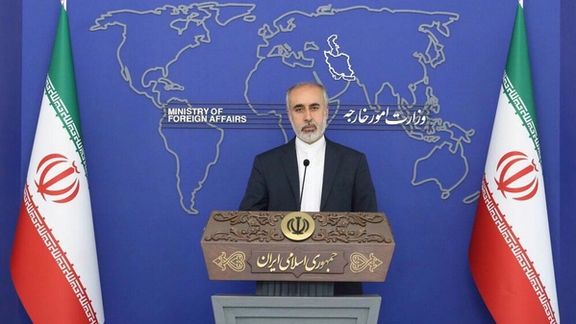
Following President Joe Biden’s Middle East tour, Iran says the United States seeks to foment crisis in the region through its policy of Iranophobia.

Following President Joe Biden’s Middle East tour, Iran says the United States seeks to foment crisis in the region through its policy of Iranophobia.
Iran's Foreign Ministry spokesman Nasser Kanaani made the remarks on July 16, in reaction to Biden’s address to a summit of regional Arab states in the Saudi city of Jeddah, accusing the Islamic Republic of destabilizing activities in the region.
Rejecting the US president’s remarks as unacceptable and unfounded, Kanaani said, "Such groundless allegations are in line with Washington’s policy to incite sedition and create tension in the region... by resorting to its failed policy of Iranophobia.”
“False accusations that the United States levels against Iran’s peaceful nuclear program while turning a blind eye to several decades of the Zionist regime’s deception as a regime that is not a member of the nuclear Non-Proliferation Treaty (NPT) while possessing the biggest nuclear arsenal in the region, are a major sign of hypocrisy of the US government,” he added.
Biden said during his tour that "Around the world, we’re seeing efforts to undermine the rules-based order: with China’s increasingly coercive actions in the Indo-Pacific and beyond; with Russia’s brutal and unprovoked war against its neighboring Ukraine; and with Iran’s destabilizing activities," emphasizing that “It’s only becoming clear to me how closely interwoven America’s interests are with the successes of the Middle East…We will not walk away and leave a vacuum to be filled by China, Russia or Iran.”
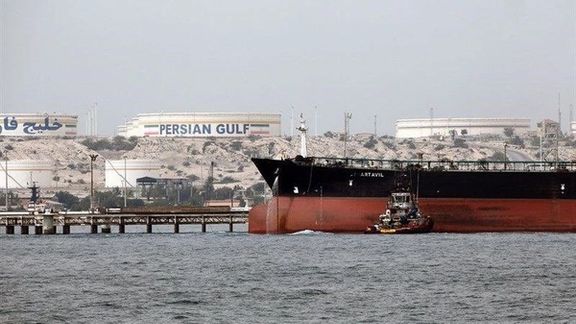
Russia is taking market share from Iran’s bitumen (asphalt) exports, Tehran media reported Saturday, as a trade competition has flared between the two allies.
The general secretary of oil by-products exporters union, Hamid Hosseini was quoted by Fararu website as saying that Iran has lost about a quarter of its bitumen exports, mainly to India, because of steep discounts by Russia. In the last three months Iran’s monthly exports of the oil by-product dropped from 430,000 tons to 330,000, Hosseini said.
Reports about Russia taking market share from Iran in oil and steel exports emerged in June. Kpler, an industry intelligence firm reported that Iran’s oil sales to China “had halved” in May, as Russia offered larger discounts. Other sources later confirmed the fierce competition for market share, although it is not clear how much sales Iran has lost.
In May, Reza Shahrestani, a member of Iran’s steel producers’ association told local media that exports had stopped from mid-March to early May to China, Afghanistan, Thailand and South Korea, Tehran’s biggest customers, who shifted to buying discounted Russian steel.
The two countries are strategic allies, with Tehran subtly supporting Russia in its Ukraine invasion by blaming NATO expansion for the conflict, but also calling for an end to hostilities.
They are also allies in the Syrian civil war, where Russia intervened in 2015 to save Bashar al Assad’s rule against Sunni rebels. Its air power proved decisive as thousands of Iranian forces were bogged down in fighting. Assad reclaimed most of the territory taken by rebels, but Iran also found a foothold in the country with designs against neighboring Israel.
The loss of market share in bitumen or asphalt exports could cost Iran up to $50,000 million a month, given higher oil prices. At the same time Russia’s ambassador in Tehran Levan Dzhagaryan (Jagarian) on Saturday criticized Iran for owing Moscow hundreds of million of dollars and not making payments.
All types of exports are vital for Iran amid US oil and banking sanctions. The government faces a more than a 50-percent budget deficit, with annual inflation at 55 percent and popular discontent rising.
In recent days, US National Security Adviser Jake Sullivan has accused Russia and Iran of preparing a military drone deal, with Moscow sending a delegation to Iran to review options to buy drones to use in Ukraine. Iran has tried to dispel concerns by saying that it would not side with warring sides, but there is some evidence of Russian interest in acquiring Iranian drones.
Russian President Vladimir Putin is scheduled to visit Tehran on Tuesday, July 19 and will meet Iran’s Supreme Leader Ali Khamenei. The visit follows US President Joe Biden’s tour of the Middle East, and is seen by some as Putin’s answer to American efforts at unifying its regional allies.
Iran’s anti-West and pro-Russia posture increasingly raises questions even among some Islamic Republic politicians. Also, the business community, which can be considered loyal to the regime have begun expressing concern over Russia competition.
The Wall Street Journal wrote on July 16, “Within Iran, the fight has highlighted divisions over the country’s alignment with Russia, which the Tehran government has backed through the Ukraine invasion while the Iranian business community privately simmers over what it sees as unfair competition.”
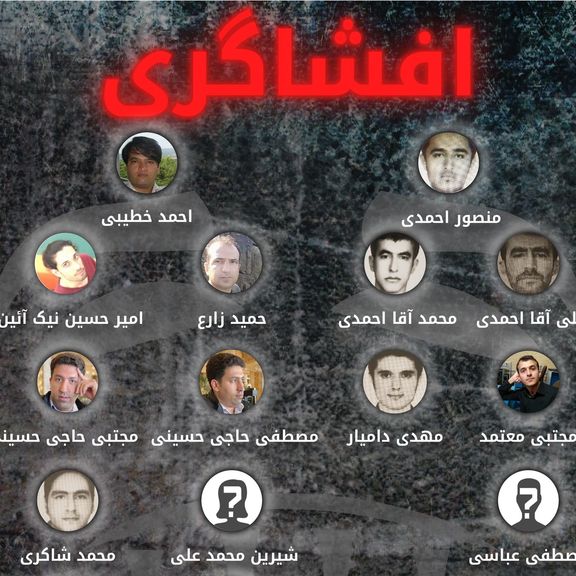
A hacking group has revealed the identities of several hackers working for the cyber division of Iran’s Revolutionary Guard (IRGC).
According to information obtained by Iran International July 16, these hackers – or the so-called Iranian Cyber Army -- work for Naji Technology and Afkar System companies, which are affiliated with the IRGC.
In their report, the hacktivist group, called ‘Lab-Doukhtegan’ or ‘Sealed Lips’, said these IRGC hackers “repeatedly attacked targets in the US and Europe with the aim of extortion," making use of "the security loopholes discovered in European and American organizations.”
Early in June, the ranking member of the US Senate Foreign Relations Committee condemned the cyberattack by Iran-backed hackers on Boston Children’s Hospital last summer.
Describing the attempted attack as “deeply disturbing,” Idaho’s Republican Senator Jim Risch said that “it’s typical of a regime that’s synonymous with global terrorism.”
Later in June, Israeli Defense Minister Benny Gantz said an IRGC cyber unit called “Shahid Kaveh” conducted research to damage ships, gas stations and industrial plants in several countries including Britain, the US, France and Israel.
Gantz hinted that Israel -- which is widely believed to have waged cyber war against Iran's nuclear facilities and other infrastructure -- may retaliate physically against enemy hackers.
Iran has been repeatedly accused of cyber-attacks against the West, Israel and rival Arab countries in the Middle East.
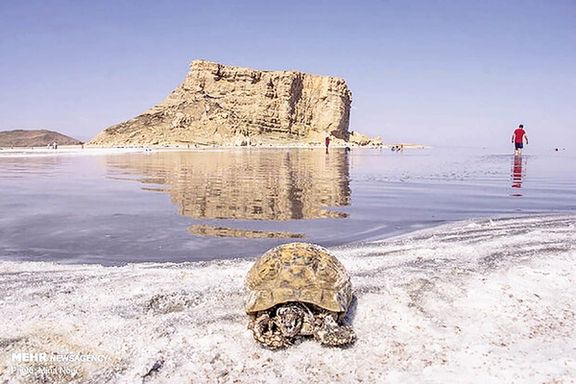
Police arrested activists when hundreds protested in northwestern Iran Saturday to government neglect of the country's largest lake that has shrunk by 95 percent.
Lake Urmia (Orumiyeh), near Western Azerbaijan Province capital of the same name, has lost 95 percent of its water over the past three decades, despite government claims that it has appropriated hundreds of million of dollars to prevent the environmental disaster.
At its greatest extent, Urmia was the largest lake in the Middle East and sixth largest salt lake in the world, with an original surface area of 5,200 square kilometers in 1970s, or 2,000 square miles. It had shrunk to 700 sq km by 2013. The lake began shrinking in the 1980s due to water mismanagement and climate change.
Activists had called for protests Saturday and a few hundred people gathered in Orumiyeh city chanting slogans against the government and parliament. Reports say that authorities have dispatched riot-control reinforcements to West and East Azerbaijan provinces and arrested at least 13 activists and citizens in Orumiyeh, Tabriz and other cities in the region. The detainees have been transferred to unknown locations.
The chief of police in in Western Azerbaijan, Rahim Jahanbakhsh, called the protesters “villains” and anti-regime elements.
Activists had issued calls for protests in the past week, concerned about the complete disappearance of lake Urmia.
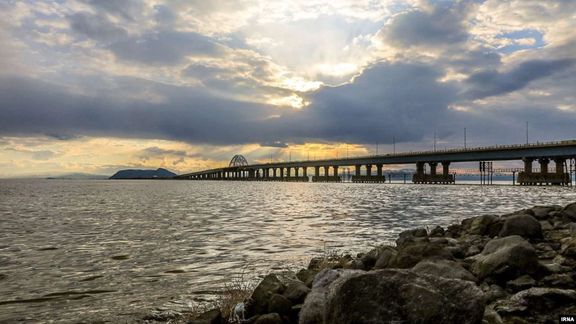
In the past decade successive governments pledged money and projects to prevent the shrinking of the lake.
Authorities announced in 2014 that the government of President Hassan Rouhani appropriated 150 trillion rials – which can be about one billion dollars considering the lower rate of dollar against rial back then – were allocated for a seven-year plan as well as another $10 million aid by Japan and some other pledges by the United Nations Food and Agriculture Organization (FAO) and the United Nations Development Program (UNDP) to save the lake. It is not clear whether or how the earmarked budgets were spent.
The lake began to revive briefly in the spring of 2019 when Iran’s drought came to a temporary end with months of heavy rains and floods. The lake’s surface expanded back to 2,000 sq kilometers by April 2019. But precipitation began to decrease again, with the 2021-2022 season becoming the worst dry period in recent memory.
The lake’s partial recovery would have been a golden opportunity for the government to act to save the ancient body of water, which is part of an ancient sea covering the region, together with Lake Van in present-day Turkey and the Caspian Sea, the largest inland lake.
But the government failed to unwind the disastrous water management mistakes that contributed to Lake Urmia’s gradual death.
Experts say groundwater extraction and using the water of the once bountiful Zarrineh Rud river− which feeds Urmia Lake − for irrigating apple orchards planted in the last two decades have both contributed to the lake shrinking by nearly 95 percent in volume over the past 20 years.
During the presidency of populist politician Mahmoud Ahmadinejad a policy of food self-sufficiency and reinforcing agriculture led to unrestricted use of groundwater, building of ill-planned dams and other unscientific decisions. In 2021 alone, more than 100,000 tons of apples grown in the area went to waste with a failure to secure export markets.
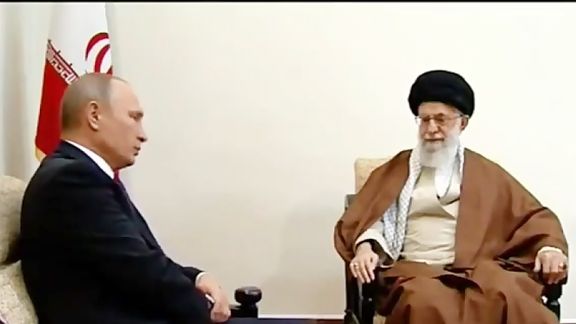
Iran's government has sent a bill to parliament to approve the outlines of a cooperation agreement with Russia for information and intelligence cybersecurity.
Rouydad 24 news website in Tehran briefly mentioning the bill and asked the opinion of two lawmakers, who did not have full information about what the agreement exactly stands for. Apparently, the proposal was adopted by the government in May, and it sent a brief note to parliament recently soliciting its blessing. This is also odd because it is not a treaty requiring official parliament approval.
Alireza Pakfetrat, a lawmaker from Shiraz, claimed in an interview on Saturday [July 16] with Rouydad 24 that "Iran is a superpower not any smaller than Russia." He said that Tehran should deal with Moscow based on equality and give only as much as it receives. The government should also safeguard sensitive information, whether in relation to Russia or any other country.
The bill refers to “information” but the Persian term etela’at could mean both "information" and "intelligence.”
The proposed agreement popped out as Russian leader Vladimir Putin was slated to visit Tehran and meet with Supreme Leader Ali Khamenei next week. Some see his visit as a sign of alliance between the two countries and a signal to indicate that Russia is standing alert to developments in the Persian Gulf. The lawmaker's comments could be a prelude to Putin's visit.
Pakfetrat spoke about Iran's power on the same day that leaders of Persian Gulf littoral states expressed concern over Iran's threats to the region's security during a summit with US President Joe Biden, who said the United States will not leave the region to Russia, China and Iran.
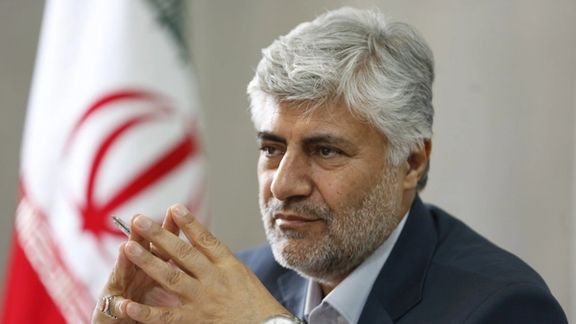
IRGC-linked Tasnim News Agency on Friday broke the news about the launching of Iranian navy’s first drone carriers and posted a picture of a drone-carrying vessel. At the same time, US National Security Adviser Jake Sullivan twice this week insisted that Iran might be getting ready to sell military drones to Russia to be used in Ukraine.
The agreement with Russia is also aimed at facilitating "investment in the infrastructure of information security," as well as expanding cooperation in the areas of security and exchanging information/intelligence.
The discussion of security cooperation and information sharing with Russia marks a turning point in Iran's position on the issue. For many years Tehran has been insisting on the secrecy of its information. According to Rouydad24, critics say the bill shows the extent of Russian infiltration in the Iranian establishment.
Pakfetrat said: "We are still committed to the 'Neither East, Nor West' motto, so our cooperation with Russia should take place on the condition that Iran's security secrets do not fall in the hands of other countries."
He claimed that the parliament is equally sensitive to Iran's exchanges with other countries and there is no difference in this regard between Russia and other states. "We will not allow any infiltration," he insisted.
Meanwhile, ‘reformist’ lawmaker Massoud Pezeshkian said he was not aware of the details of the bill, "however, I am sure every country is following its own interests. If Russia comes to us, it is for the sake of its own benefit. Our politicians should consider Iran's interests and not allow the other side to do whatever it wishes."
Asked if this was against the "Neither East, Nor West" motto, Pezeshkian said: "We have distanced ourselves from that policy long time ago. We have let the West go and now we are part of the East."
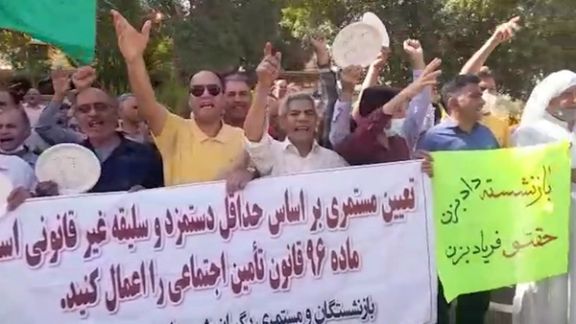
Iranian pensioners held nationwide demonstrations on Saturday, and chanted slogans against the Islamic Republic’s authorities.
Similar to previous rounds of protests, which have become more frequent on the backdrop of economic hardship, pensioners called on the government to increase pensions by 38 percent, as stipulated by the Supreme Labor Council. Retirees are demanding pension increases more on par with rising prices of essential foods, saying that the current payments are not in line with decrees by the Council.
According to videos published on social media, about 20 cities across the country, including capital Tehran, Kerman, Ardabil, Esfahan, Rasht, Mashhad, Tabriz, Khorramshahr and Ahvaz, were the scene of large protest rallies.
The retirees gathered in front of the governorate buildings or the provincial offices of the Social Security Organization, which is in charge of paying pensions.
They chanted slogans against President Ebrahim Raisi and Parliament Speaker Mohammad Bagher Ghalibaf such as “Death to Raisi” and “Death to Ghalibaf” as well as other insults about the clergy, whom many people blame for the dire situation in the country.
With food prices rising faster after four years of United States’ ‘maximum pressure’ sanctions, Iranian workers and retirees have been holding regular protests or strikes to demand higher salaries. Last month, Iran’s currency fell to a historic low of 333,000 rials to the US dollar in June.
During the past weeks, widespread protests by workers,shop owners, and teachers protesting against poverty, inflation, and low wages, have been met with heavy-handed crackdown and numerous arrests by the security forces.